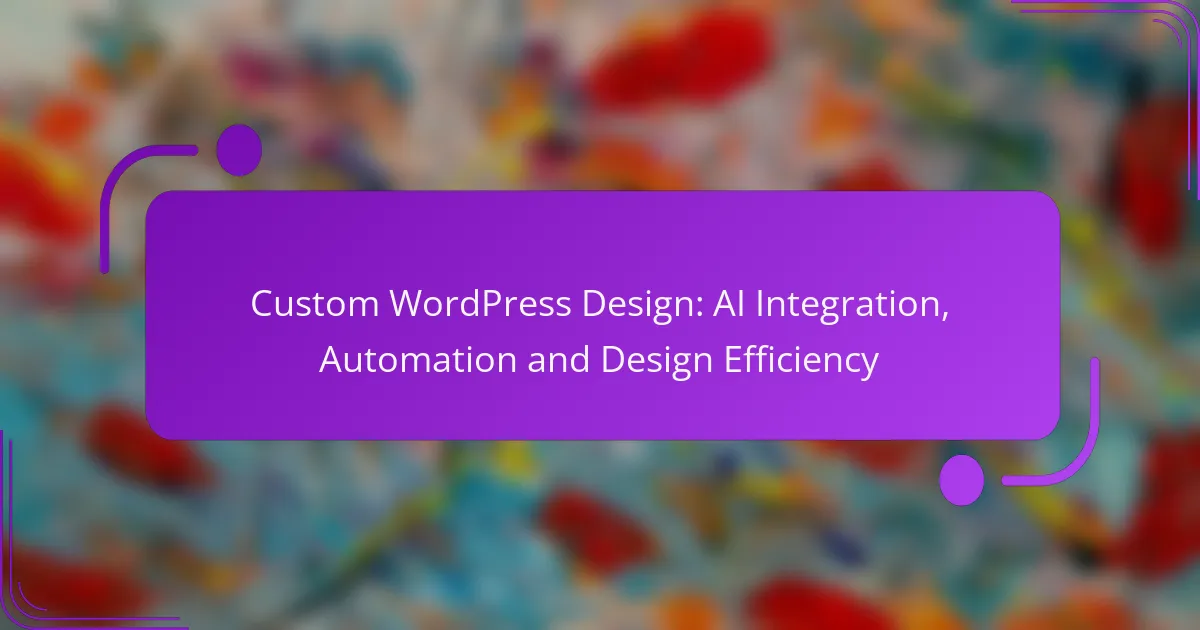Custom WordPress design enhanced by AI integration revolutionizes the way businesses create and manage their online presence. By utilizing AI tools, designers can craft personalized websites that adapt to user preferences, significantly improving engagement and conversion rates. Additionally, automation streamlines design processes, allowing for greater efficiency and enabling creatives to focus on innovative aspects of their projects.
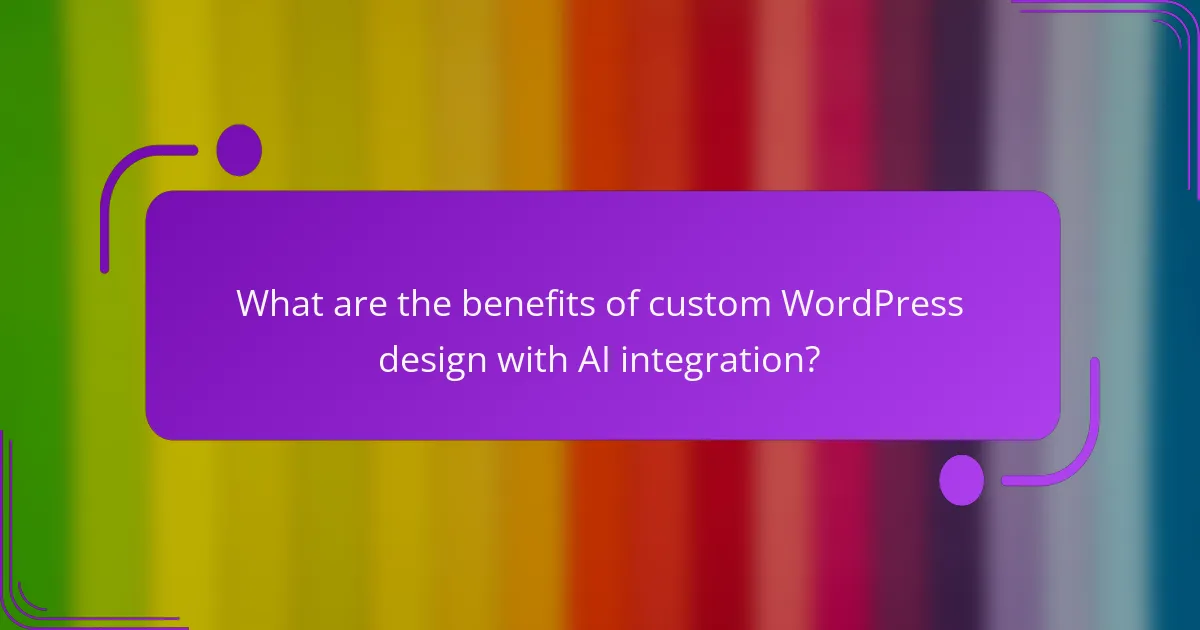
What are the benefits of custom WordPress design with AI integration?
Custom WordPress design with AI integration offers significant advantages, including enhanced user experiences and increased design efficiency. By leveraging AI tools, businesses can create tailored websites that respond to user behavior and preferences, ultimately driving engagement and conversions.
Enhanced user experience
AI integration can significantly enhance user experience by personalizing interactions on a website. For example, AI-driven chatbots can provide instant support, while recommendation engines can suggest products based on user behavior.
Additionally, AI can analyze user data to optimize website navigation and layout, ensuring that visitors find what they need quickly. This leads to lower bounce rates and higher satisfaction levels among users.
Increased design efficiency
With AI tools, designers can automate repetitive tasks, such as image resizing or layout adjustments, which streamlines the design process. This efficiency allows teams to focus on more creative aspects of web design, leading to innovative solutions.
For instance, AI can generate design variations based on user feedback, enabling rapid prototyping and testing. This not only saves time but also reduces costs associated with traditional design methods.
Personalized content delivery
AI enables personalized content delivery by analyzing user preferences and behavior. This means that visitors can see tailored content that resonates with their interests, increasing engagement and conversion rates.
For example, an e-commerce site can display products based on previous purchases or browsing history, making the shopping experience more relevant and enjoyable for users.
Improved SEO performance
Integrating AI into custom WordPress design can lead to improved SEO performance by optimizing content for search engines. AI tools can analyze keywords, suggest improvements, and even automate content creation to ensure it aligns with SEO best practices.
Moreover, AI can help identify trends and user queries, allowing businesses to create content that meets search demand. This proactive approach can enhance visibility and drive organic traffic to the site.
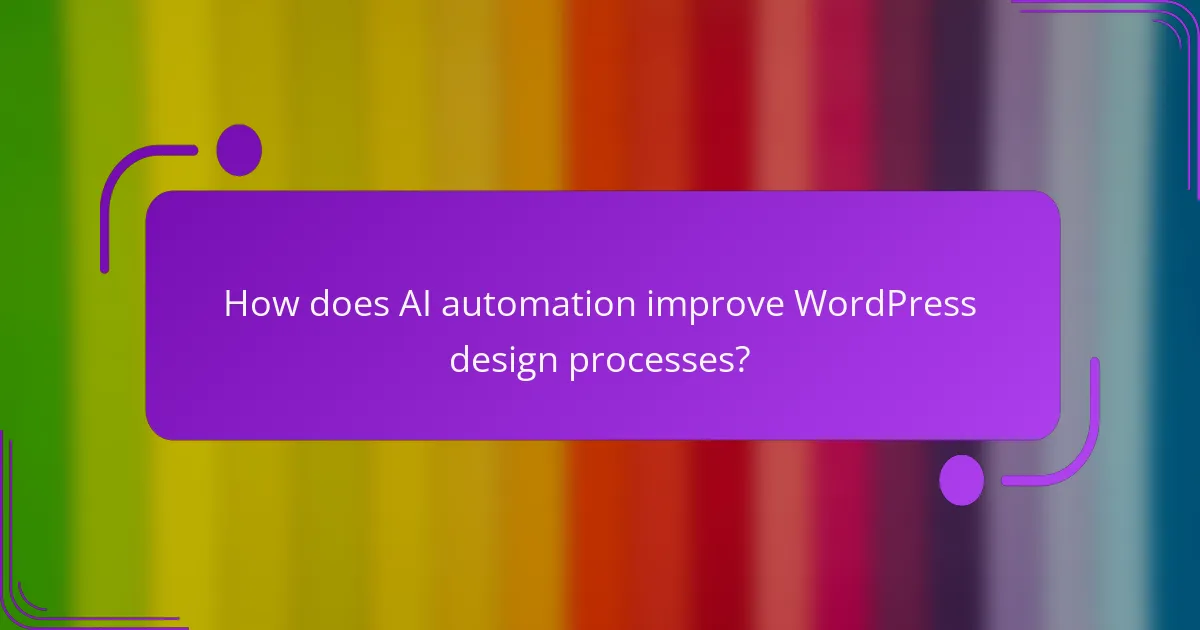
How does AI automation improve WordPress design processes?
AI automation enhances WordPress design processes by optimizing efficiency and reducing manual effort. It streamlines various tasks, allowing designers to focus on creativity while technology handles repetitive actions.
Streamlined workflow management
AI tools can automate project management tasks, such as assigning roles, tracking progress, and setting deadlines. This leads to a more organized workflow, minimizing delays and miscommunication among team members.
For instance, using AI-driven project management software can help prioritize tasks based on urgency and importance, ensuring that critical design elements are completed on time. This can save designers several hours each week, allowing them to allocate more time to creative aspects.
Automated content generation
AI can generate content for websites, including text, images, and even video, based on specified parameters. This automation can significantly reduce the time spent on content creation, making it easier to maintain fresh and relevant material.
For example, AI tools can create blog posts or product descriptions tailored to specific keywords, enhancing SEO efforts. This can lead to improved visibility and engagement without the need for extensive manual writing.
Real-time design adjustments
AI technologies enable real-time adjustments to design elements based on user interactions and preferences. This means that websites can adapt dynamically, improving user experience and engagement.
For instance, AI can analyze user behavior to suggest layout changes or content placements that enhance conversion rates. Implementing these adjustments can lead to higher user satisfaction and increased sales, making it a valuable investment for any WordPress site.
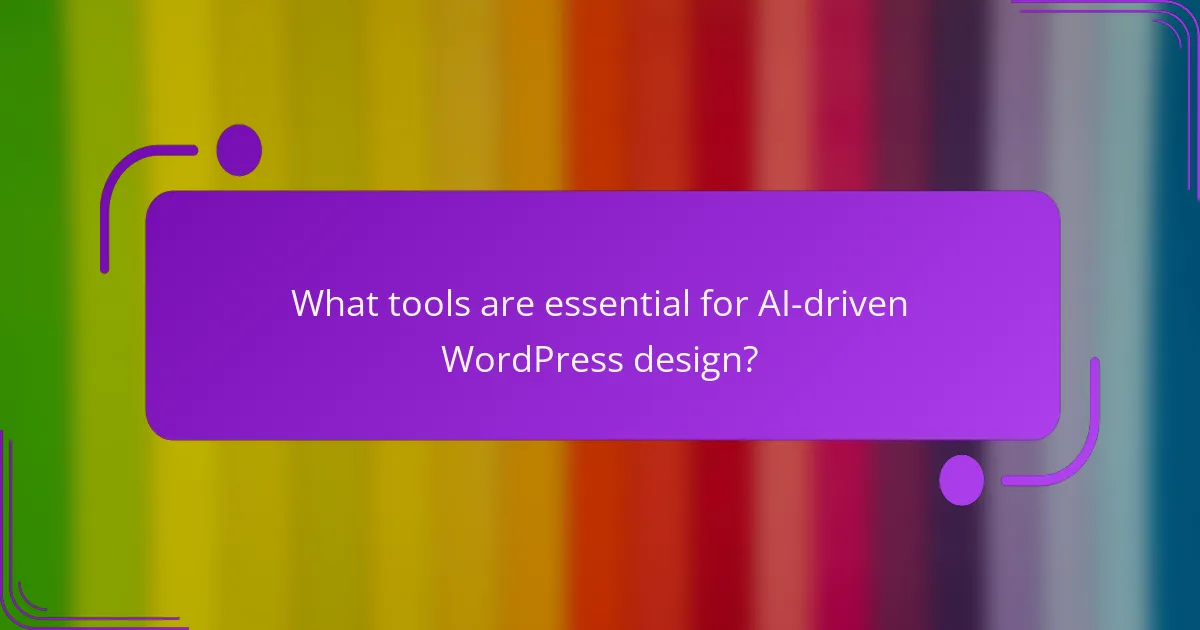
What tools are essential for AI-driven WordPress design?
Essential tools for AI-driven WordPress design include platforms that enhance automation, improve design efficiency, and facilitate content creation. These tools leverage artificial intelligence to streamline workflows and elevate the overall design process.
Elementor with AI features
Elementor is a popular WordPress page builder that now incorporates AI features to enhance design capabilities. Its AI tools can suggest layout improvements, optimize images, and even generate design elements based on user preferences.
When using Elementor, consider its AI-driven templates that adapt to your content type, making it easier to create visually appealing pages quickly. This can significantly reduce the time spent on manual design adjustments.
Adobe Sensei for design assistance
Adobe Sensei integrates AI technology into Adobe’s suite of design tools, providing intelligent features that assist with graphic design and layout. It can automate repetitive tasks, such as image resizing and color matching, allowing designers to focus on creativity.
Utilizing Adobe Sensei can lead to more efficient workflows, especially for teams working on large projects. Its ability to analyze design trends can also help ensure that your WordPress site remains modern and appealing.
ChatGPT for content creation
ChatGPT is an AI language model that can assist in generating high-quality content for your WordPress site. It can produce blog posts, product descriptions, and marketing copy, saving time and enhancing creativity.
When using ChatGPT, provide clear prompts to get the best results. For example, specify the tone and style you want, and review the generated content for accuracy and relevance before publishing. This ensures that the content aligns with your brand voice and engages your audience effectively.
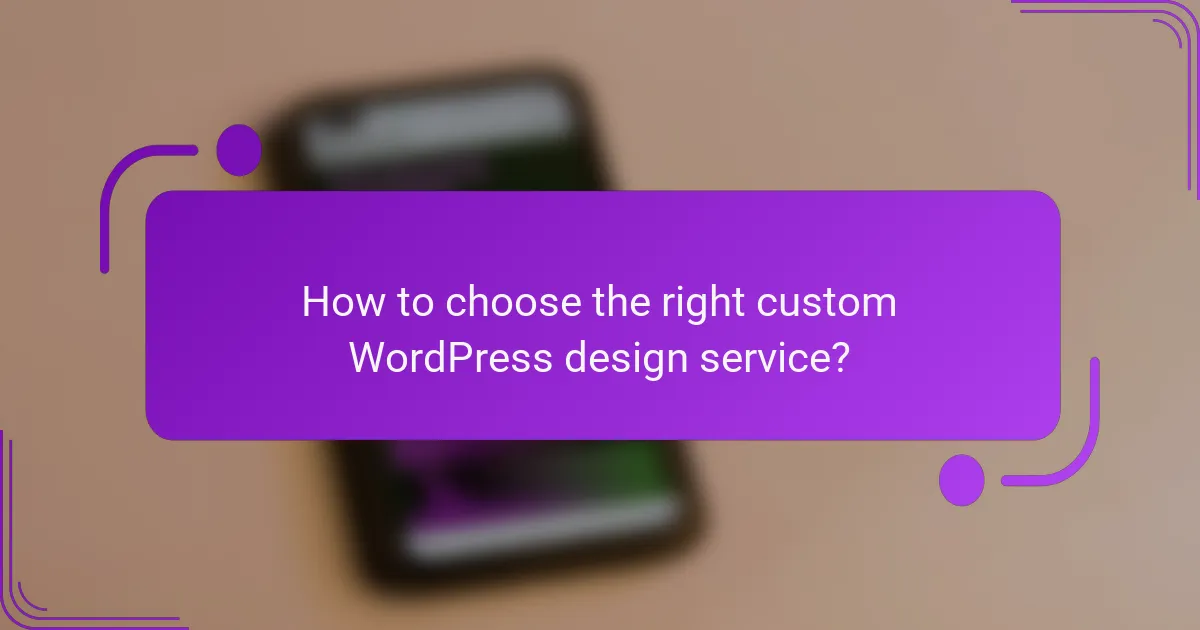
How to choose the right custom WordPress design service?
Choosing the right custom WordPress design service involves evaluating their expertise, client feedback, and pricing structures. Focus on finding a provider that aligns with your specific needs and budget while demonstrating a strong track record of successful projects.
Evaluate portfolio and case studies
Start by reviewing the service provider’s portfolio to gauge their design style and capabilities. Look for case studies that highlight their process, challenges faced, and the solutions they implemented. This will give you insight into their problem-solving skills and creativity.
Pay attention to the diversity of projects in their portfolio. A well-rounded portfolio with various industries indicates adaptability and experience. Aim for providers who showcase work similar to your desired project to ensure they understand your vision.
Check client testimonials and reviews
Client testimonials and reviews are crucial for assessing the reliability of a custom WordPress design service. Look for feedback on platforms like Google, Yelp, or specialized design forums to get an unbiased view of their performance. Positive reviews often highlight timely delivery, communication, and quality of work.
Be cautious of services with overwhelmingly positive reviews, as they may not reflect the full picture. Seek out constructive criticism in reviews to understand potential weaknesses or areas of concern. A balanced view will help you make an informed decision.
Assess pricing models and packages
Understanding the pricing models and packages offered by custom WordPress design services is essential for budgeting. Some providers may charge a flat fee, while others operate on an hourly basis or offer tiered packages based on features. Compare these models to find one that fits your financial plan.
Request detailed quotes that break down costs for design, development, and any additional services like maintenance or SEO. This transparency will help you avoid unexpected expenses. Consider the value offered in relation to the price, ensuring you get quality service for your investment.
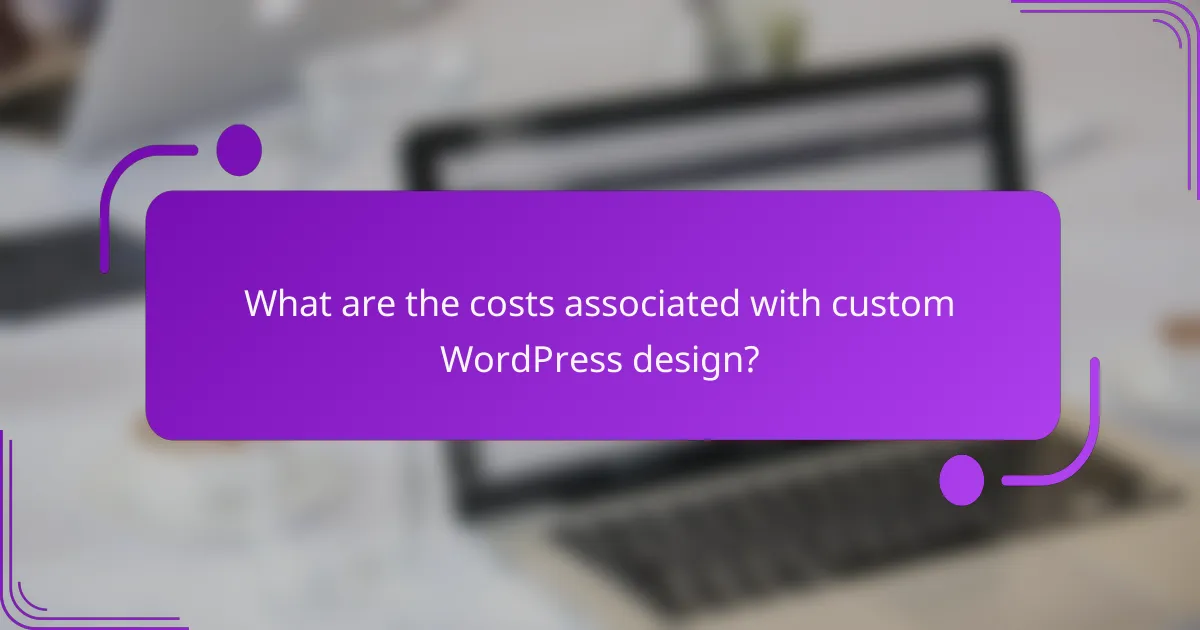
What are the costs associated with custom WordPress design?
The costs of custom WordPress design can vary significantly based on several factors, including the complexity of the project and the expertise of the designer. Generally, businesses should expect to invest anywhere from a few hundred to several thousand dollars for a fully customized website.
Average pricing ranges
For basic custom WordPress designs, prices typically start around $500 to $1,500. More advanced designs with unique features and functionalities can range from $1,500 to $5,000. High-end projects, which may include extensive custom coding and integrations, can exceed $5,000 and reach upwards of $10,000 or more.
Freelancers may offer lower rates compared to established agencies, but the quality and support can vary. It’s essential to evaluate portfolios and client reviews when considering options.
Factors influencing cost
Several factors can influence the cost of custom WordPress design, including the complexity of the design, the number of pages, and the specific functionalities required. Custom features, such as e-commerce capabilities or membership systems, will typically increase the overall cost.
The experience level of the designer or agency also plays a crucial role. More experienced professionals may charge higher rates but often deliver better quality and support. Additionally, ongoing maintenance and updates should be factored into the overall budget, as these can add to long-term costs.
